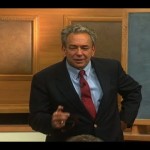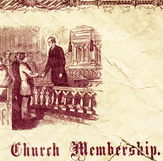 In an article entitled “Faith Has Its Reasons” Dr. R. C. Sproul writes:
In an article entitled “Faith Has Its Reasons” Dr. R. C. Sproul writes:
Christians from every theological tradition have for centuries confessed their faith by reciting the Apostles’ Creed. Elsewhere I have taught on the actual content of this creed, but if there is one aspect of this confession that we often fail to reflect on, it is the creed’s opening words: I believe.
Here I want to consider faith in relation to what are often seen as its opposites—reason and sense perception. Epistemology is the division of philosophy that seeks to answer one question: How do we know what we know, or how do we know what is true? Reason, sense perception, or some combination of the two have been among the most common answers to this basic question.
Our minds function according to certain categories of rationality. We try to think in a logically coherent manner. Our judgments and deductions are not always correct and legitimate, but our minds always look for logical, intelligible patterns. Some people say that we find true knowledge exclusively within the mind. These “rationalists” stress the mind and reason as the sources of true knowledge.
The mind processes information that we acquire with our five senses. Our minds act on what we see, hear, feel, smell, and taste. Perception is the experience of being in touch with the external world, and “empiricists” emphasize sense perception as the true basis for knowledge.
The scientific method combines sense perception and reason. In scientific experiments we gather facts with our senses. Our minds then draw conclusions, reasoning through what our five senses discover. Some want to oppose this way of learning to faith, but I don’t find in Scripture the idea that faith is irrational or anti-sense perception. According to God’s Word, reason and sense perception form the foundation of knowledge. Faith rests on this foundation but takes us beyond it.
We live in the most anti-intellectual age of history, and even many Christians believe we can compartmentalize faith as a way of knowing completely separate from sense perception and reason. Yet as Augustine told us centuries ago, how could we receive knowledge from God if it were not accessible to the human mind? Could we say that “Jesus is Lord” without some understanding of what the term Lord means, what the verb is indicates, and who the name Jesus refers to? We can’t believe the gospel without our minds understanding it to a degree.
Christianity also features a book—the Bible—that is designed for our understanding. Why would God give us a written document if faith bypasses reason entirely? Moreover, sense perception is key to the biblical story. Luke wrote down those things to which he had eyewitness testimony (Luke 1:1–4). Peter said the Apostles didn’t proclaim clever myths but what they saw with their eyes and heard with their ears (2 Peter 1:16). The biblical writers tell us about actual events in history that they experienced. Christianity isn’t ahistorical. God reveals Himself with reference to history: He is “the God of Abraham, of Isaac, and of Jacob” (Ex. 3:16).
Faith never requires us to crucify our minds or deny our senses. It’s not virtuous to take a “leap of faith” if that means we plunge into irrationality. The Bible never calls us to leap into the darkness but to leap out of the darkness into the light.
The New Testament defines faith as the substance of things hoped for and the evidence of things unseen (Heb. 11:1). This doesn’t mean faith is against what we see. We are called to trust Him whom we haven’t seen—God—but He hasn’t remained wholly invisible. We have seen the Lord’s handiwork in this world, which Calvin called “a magnificent theater of natural revelation.” One day we’ll see Him directly in the beatific vision of His glory, but until then, He has not left Himself without a witness in creation.
Revelation is the third category of knowledge. Christianity is a revealed religion. The Christian God is not mute. When we talk about faith as the evidence of things not seen, we’re talking about believing the Lord who has spoken. Not just believing in God but believing God. Believing God for things we cannot see now is the essence of faith, but it’s not an irrational or unscientific faith. God makes it very rational for me to believe He’s there. He’s shown Himself in the created order. He’s broken into time and space. Jesus came in the flesh, was seen, and rose from the dead in history. The Apostles testify to these events in Scripture, recording those things they witnessed with their senses.
It’s not irrational to believe in the One who vindicated Himself as the incarnation of truth. This is not blind faith but faith that embraces testimony. The real opposites of faith are not reason and sense perception but credulity and superstition. Credulity, or naive believism, believes something that has no basis in reality. Superstition believes in magical things that have nothing to do with Scripture.
We find superstition and credulity throughout the church. That’s why we continually measure our faith by the Word of God and make sure we are assenting to the reasonable, historical testimony of the prophets and the Apostles to the triumph of Christ. Faith is not mere intellectual assent. We aren’t saved simply because we affirm the truth of certain facts but because we trust the Person whom those facts reveal. So, faith is definitely more than knowledge. But it is not less.


